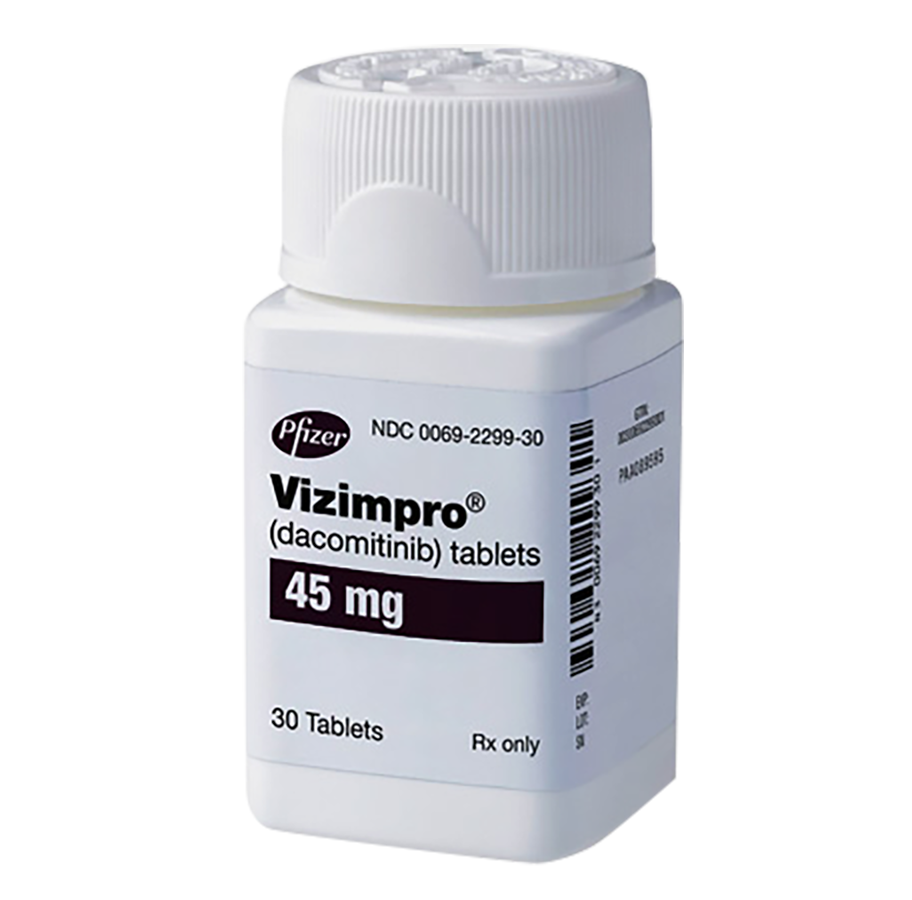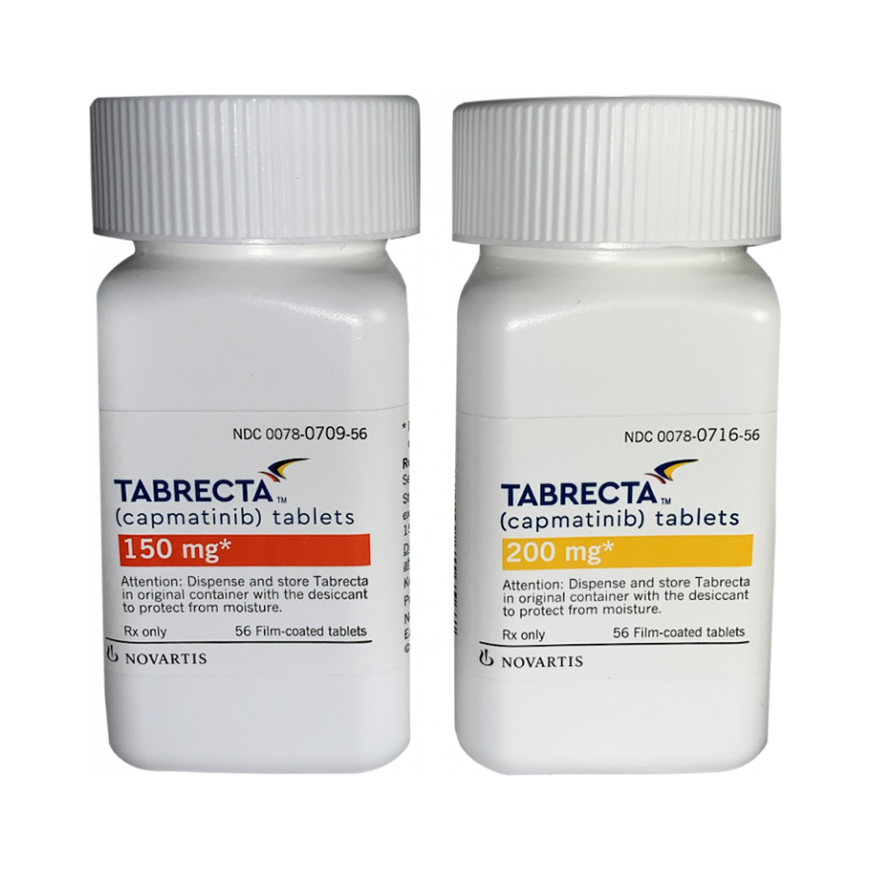Vizimpro (dacomitinib) vs Tabrecta (capmatinib)
Vizimpro (dacomitinib) vs Tabrecta (capmatinib)
Vizimpro (dacomitinib) and Tabrecta (capmatinib) are both oral medications used in the treatment of non-small cell lung cancer (NSCLC) but they target different genetic mutations. Vizimpro is a pan-human epidermal growth factor receptor (EGFR) inhibitor indicated for the first-line treatment of patients with NSCLC with EGFR exon 19 deletion or exon 21 L858R substitution mutations. On the other hand, Tabrecta is a MET inhibitor approved for adult patients with metastatic NSCLC that have mutations that lead to MET exon 14 skipping. For someone deciding on which medicine is right for them, it is crucial to have their tumor tested for specific genetic alterations; Vizimpro would be considered if an EGFR mutation is present, while Tabrecta would be the choice for those with a MET exon 14 skipping mutation. It is important to consult with a healthcare provider to determine the most appropriate treatment based on the individual's specific cancer profile and overall health.
Difference between Vizimpro and Tabrecta
| Metric | Vizimpro (dacomitinib) | Tabrecta (capmatinib) |
|---|---|---|
| Generic name | Dacomitinib | Capmatinib |
| Indications | First-line treatment of patients with metastatic non-small cell lung cancer (NSCLC) with epidermal growth factor receptor (EGFR) exon 19 deletion or exon 21 L858R substitution mutations as detected by an FDA-approved test. | Treatment of adult patients with metastatic non-small cell lung cancer (NSCLC) whose tumors have a mutation that leads to MET exon 14 skipping as detected by an FDA-approved test. |
| Mechanism of action | Irreversible inhibitor of the kinase activity of the epidermal growth factor receptor (EGFR) family. | Small molecule that targets MET, including the mutant variant produced by exon 14 skipping. |
| Brand names | Vizimpro | Tabrecta |
| Administrative route | Oral | Oral |
| Side effects | Diarrhea, rash, paronychia, stomatitis, decreased appetite, dry skin, decreased weight, alopecia, cough, pruritus. | Peripheral edema, nausea, fatigue, vomiting, dyspnea, and decreased appetite. |
| Contraindications | None known beyond hypersensitivity to dacomitinib or any of its excipients. | None known beyond hypersensitivity to capmatinib or any of its excipients. |
| Drug class | Tyrosine kinase inhibitor | Tyrosine kinase inhibitor |
| Manufacturer | Pfizer | Novartis |
Efficacy
Vizimpro (Dacomitinib) for Lung Cancer
Vizimpro, known by its generic name dacomitinib, is a kinase inhibitor used in the treatment of certain types of non-small cell lung cancer (NSCLC). Specifically, it is indicated for the first-line treatment of patients with NSCLC with epidermal growth factor receptor (EGFR) exon 19 deletion or exon 21 L858R substitution mutations as detected by an FDA-approved test. The efficacy of Vizimpro was demonstrated in a multicenter, international, open-label, randomized, controlled trial where patients treated with dacomitinib showed a significant improvement in progression-free survival compared to those treated with gefitinib, another EGFR inhibitor. This marked Vizimpro as an effective first-line treatment option for patients with EGFR-mutated NSCLC.
Tabrecta (Capmatinib) for Lung Cancer
Tabrecta, or capmatinib, is another targeted therapy approved for the treatment of adult patients with metastatic NSCLC that have mutations leading to mesenchymal-epithelial transition (MET) exon 14 skipping. This mutation can be identified through an FDA-approved test. The approval of Tabrecta was based on the results of a multicenter, non-randomized, open-label, multi-cohort study. Patients treated with Tabrecta demonstrated a substantial overall response rate, with a duration of response ranging from 1.8 to over 12 months. These results underscored Tabrecta's efficacy for patients with MET exon 14 skipping mutated NSCLC.
Both Vizimpro and Tabrecta represent a shift towards personalized medicine in the treatment of lung cancer, targeting specific mutations that drive cancer growth. The efficacy of these drugs highlights the importance of genetic testing in patients with NSCLC to identify potential candidates who would benefit from these targeted therapies. As the understanding of the molecular underpinnings of lung cancer evolves, treatments like Vizimpro and Tabrecta will continue to play a critical role in improving patient outcomes.
It is important to note that while Vizimpro and Tabrecta have shown efficacy in their respective patient populations, they are not without side effects, and their use should be guided by a healthcare professional familiar with the patient's specific condition. Ongoing clinical trials and post-marketing surveillance continue to provide additional data on the long-term efficacy and safety of these medications in the lung cancer treatment landscape.
Regulatory Agency Approvals
Vizimpro
-
European Medical Agency (EMA), European Union

-
Food and Drug Administration (FDA), USA

Tabrecta
-
European Medical Agency (EMA), European Union

-
Food and Drug Administration (FDA), USA

-
Pharmaceuticals and Medical Devices Agency (PMDA), Japan

Access Vizimpro or Tabrecta today
If Vizimpro or Tabrecta are not approved or available in your country (e.g. due to supply issues), you can access them via Everyone.org.
How it works

Make an enquiry
Choose the medicine you want to buy, answer a couple of questions, and upload your prescription to speed things up. We’ll get back to you within 24 hours.


Make an enquiry
Choose the medicine you want to buy, answer a couple of questions, and upload your prescription to speed things up. We’ll get back to you within 24 hours.


Breeze through the paperwork
We'll guide you through the required documents for importing unapproved medicine, ensuring you have all the necessary information.


Get a personalized quote
We’ll prepare a quote for you, including medicine costs and any shipping, administrative, or import fees that may apply.


Receive your medicine
Accept the quote and we’ll handle the rest - sourcing and safely delivering your medicine.

Some text on this page has been automatically generated. Speak to your physician before you start a new treatment or medication.
Let's talk
If you have any questions, call us or send us a message through WhatsApp or email:
Contact us




